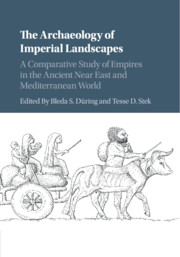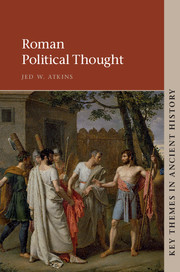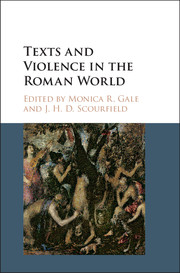Refine search
Actions for selected content:
23990 results in Ancient history
Dedication
-
- Book:
- Texts and Violence in the Roman World
- Published online:
- 29 March 2018
- Print publication:
- 05 April 2018, pp v-vi
-
- Chapter
- Export citation
Chapter 7 - Dismemberment and the Critics
-
-
- Book:
- Texts and Violence in the Roman World
- Published online:
- 29 March 2018
- Print publication:
- 05 April 2018, pp 215-245
-
- Chapter
- Export citation
Works Cited
-
- Book:
- Texts and Violence in the Roman World
- Published online:
- 29 March 2018
- Print publication:
- 05 April 2018, pp 338-373
-
- Chapter
- Export citation
Chapter 4 - Make War Not Love
-
-
- Book:
- Texts and Violence in the Roman World
- Published online:
- 29 March 2018
- Print publication:
- 05 April 2018, pp 110-139
-
- Chapter
- Export citation
Chapter 10 - Cruel Narrative
-
-
- Book:
- Texts and Violence in the Roman World
- Published online:
- 29 March 2018
- Print publication:
- 05 April 2018, pp 286-308
-
- Chapter
- Export citation
Chapter 9 - Tacitus and the Language of Violence
-
-
- Book:
- Texts and Violence in the Roman World
- Published online:
- 29 March 2018
- Print publication:
- 05 April 2018, pp 269-285
-
- Chapter
- Export citation
Chapter 3 - Discipline and Punish
-
-
- Book:
- Texts and Violence in the Roman World
- Published online:
- 29 March 2018
- Print publication:
- 05 April 2018, pp 87-109
-
- Chapter
- Export citation
Index
-
- Book:
- Texts and Violence in the Roman World
- Published online:
- 29 March 2018
- Print publication:
- 05 April 2018, pp 374-384
-
- Chapter
- Export citation
Preface
-
- Book:
- Texts and Violence in the Roman World
- Published online:
- 29 March 2018
- Print publication:
- 05 April 2018, pp xiii-xiv
-
- Chapter
- Export citation
Chapter 1 - Comic Violence and the Citizen Body
-
-
- Book:
- Texts and Violence in the Roman World
- Published online:
- 29 March 2018
- Print publication:
- 05 April 2018, pp 44-62
-
- Chapter
- Export citation

The Archaeology of Imperial Landscapes
- A Comparative Study of Empires in the Ancient Near East and Mediterranean World
-
- Published online:
- 04 April 2018
- Print publication:
- 29 March 2018

Roman Political Thought
-
- Published online:
- 30 March 2018
- Print publication:
- 12 April 2018

Texts and Violence in the Roman World
-
- Published online:
- 29 March 2018
- Print publication:
- 05 April 2018
Thirteen - Towards a Patchwork Perspective on Ancient Empires
- from III - Comparing Repertoires of Rule in Rural and Peripheral Regions
-
-
- Book:
- The Archaeology of Imperial Landscapes
- Published online:
- 04 April 2018
- Print publication:
- 29 March 2018, pp 351-362
-
- Chapter
- Export citation
Nine - Living on the Edge
- from II - The Transformation of Peripheral Societies and Landscapes
-
-
- Book:
- The Archaeology of Imperial Landscapes
- Published online:
- 04 April 2018
- Print publication:
- 29 March 2018, pp 240-271
-
- Chapter
- Export citation
Index
-
- Book:
- The Archaeology of Imperial Landscapes
- Published online:
- 04 April 2018
- Print publication:
- 29 March 2018, pp 363-368
-
- Chapter
- Export citation
Additional material
-
- Book:
- The Archaeology of Imperial Landscapes
- Published online:
- 04 April 2018
- Print publication:
- 29 March 2018, pp xvi-xviii
-
- Chapter
- Export citation
Two - Engineering Empire
- from I - The Transformation of Rural Societies and Landscapes
-
-
- Book:
- The Archaeology of Imperial Landscapes
- Published online:
- 04 April 2018
- Print publication:
- 29 March 2018, pp 21-47
-
- Chapter
- Export citation
One - Ancient Empires on the Ground
-
-
- Book:
- The Archaeology of Imperial Landscapes
- Published online:
- 04 April 2018
- Print publication:
- 29 March 2018, pp 1-18
-
- Chapter
- Export citation
III - Comparing Repertoires of Rule in Rural and Peripheral Regions
-
- Book:
- The Archaeology of Imperial Landscapes
- Published online:
- 04 April 2018
- Print publication:
- 29 March 2018, pp 299-362
-
- Chapter
- Export citation
